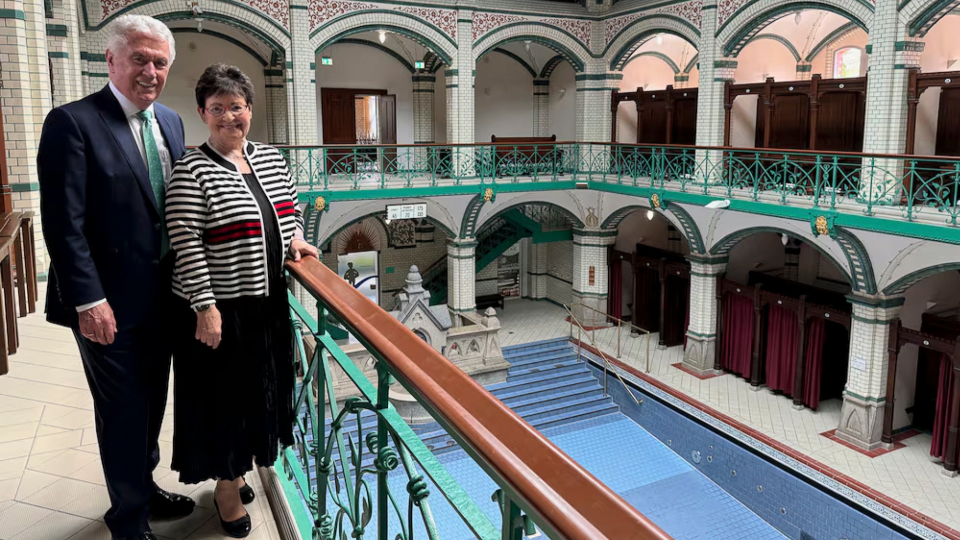
Uchtdorf-Europe-2024
Elder Dieter F. Uchtdorf and his wife, Harriet, pause for a photo at a public swimming pool in Zwickau, Germany, in late May 2024. Elder Uchtdorf was baptized at the pool as an 8 year old 75 years ago. Photo provided by Elder Dieter F. Uchtdorf, courtesy of Church News.All rights reserved.This story appears here courtesy of TheChurchNews.com. It is not for use by other media.
By Scott Taylor, Church News
Elder Dieter F. Uchtdorf has felt a close kinship to The Church of Jesus Christ of Latter-day Saints’ 19th-century pioneers ever since his early days as Church member in eastern Germany in the mid-1900s. That kinship is a part of not only his spiritual ancestry but that of all Latter-day Saints worldwide.
However, each has a share of one’s own spiritual heritage and journey, whether from Utah or Europe, or from Idaho or India. “We are all pioneers in our own sphere and circumstance,” Elder Uchtdorf of the Quorum of the Twelve Apostles has taught.
His “pioneering” included him and his family losing all material belongings twice in seven years before his 12th birthday as the six-member Uchtdorf family crossed war-torn central Europe in search of physical and political refuge. They found that — and much more, discovering spiritual refuge through the restored gospel of Jesus Christ.
“Connecting the dots” is the phrase Elder Uchtdorf used repeatedly — connecting periods of time, wide stretches of geography and life’s milestone events — in recounting experiences from a recent four-week assignment in the Europe Central Area.
Besides ministering to members and missionaries, Elder Uchtdorf and his wife, Sister Harriet Uchtdorf, retraced his steps from his birth town to crossing into Germany as a child refugee. And the Uchtdorfs revisited other German cities such as Frankfurt — where Sister Uchtdorf as a young girl joined the Church and later as a teenager first met young Dieter Uchtdorf — as well as Berlin, Hamburg and Darmstadt, all holding memories and special meanings for family, profession and Church service.
The Uchtdorfs found themselves in native lands with key anniversaries coming in 2024 — 75 years since Elder Uchtdorf’s baptism, 70 years since Sister Uchtdorf’s baptism, 30 since his call as a General Authority, 25 years since moving from Germany to Salt Lake City, and 20 years since his call as an Apostle.
“We thought, ‘Wow — for us personally, these are amazing points in our personal history,’” he said, adding, “Looking back, the dots connect.”
The personal stops — in his birth town of Ostrava, in present-day Czech Republic, and in Zwickau, Germany, where he and his family first learned of the gospel — came in addition to a busy ministry assignment from May 16 through June 10. The itinerary included meeting with missionaries from the Germany Frankfurt, Germany Berlin, Germany Hamburg, Alpine German-speaking and Czech/Slovak missions; participating in service projects at most of the mission stops; setting apart new leadership couples for the Hamburg mission and the Freiberg Germany Temple; and presiding at stake conferences in Zurich, Switzerland, and Dresden, Germany.
Elder Uchtdorf also represented the Church with civic and religious leaders in presenting humanitarian projects and donated service hours, spent time with the Europe Central Area presidency and participated in sacrament meetings as well as in meetings with members, young single adults, youth and new members.
The Uchtdorfs also paid respects to the deceased, stopping at the Nazi German Auschwitz concentration camp near Katowice, Poland; the former Plötzensee Prison site in Berlin where 17-year-old German Latter-day Saint Helmuth Hubener was executed for his resistance to the Nazi regime; and the Dresden grave of Latter-day Saint missionary Joseph Ott, who died in 1896 about a month after arriving in Germany.
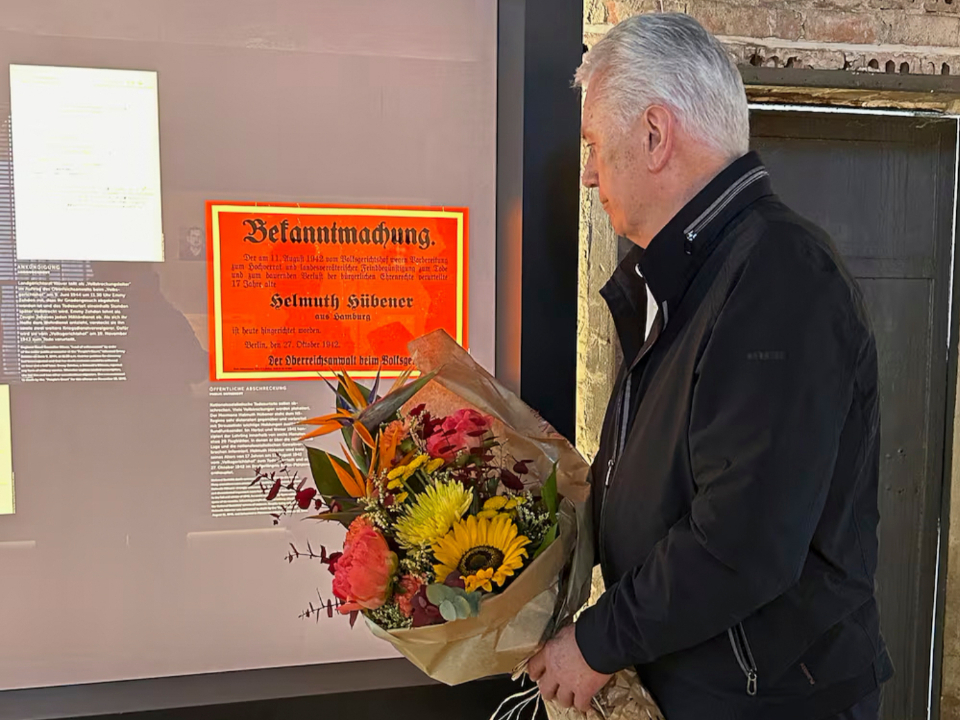
Uchtdorf-Europe-2024
Carrying a floral arrangement to lay as a tribute, Elder Dieter F. Uchtdorf reads a plaque in May 2024 at the former Plötzensee Prison site in Berlin, Germany, where 17-year-old German Latter-day Saint Helmuth Hubener was executed for his resistance to the Nazi regime. Photo provided by Elder Dieter F. Uchtdorf, courtesy of Church News.All rights reserved.Roots in Ostrava
Elder Uchtdorf spent his first four years in Ostrava, born into a German family of his parents and three older siblings. When he arrived, they were living in a large gray building near the town’s center, later moving to another home before having to flee to Zwickau on one of the last trains to leave for the west in late 1944 as the war’s front line approached.
Twenty-five years ago, Elder and Sister Uchtdorf made their first return to his birthplace, as a General Authority Seventy serving in what then constituted the Europe East Area. At the time, the city’s small branch consisted of two sister members and two missionaries.
This year, they again returned to Ostrava — where the Church now has a functioning ward and where the Czech/Slovak Mission had gathered for a mission conference and service project with the Uchtdorfs.While in Ostrava, the Uchtdorfs revisited some of the same personal sites, including the second home’s second level and balcony, where Elder Uchtdorf has recounted being a young child getting his head stuck in between the railing’s bars.
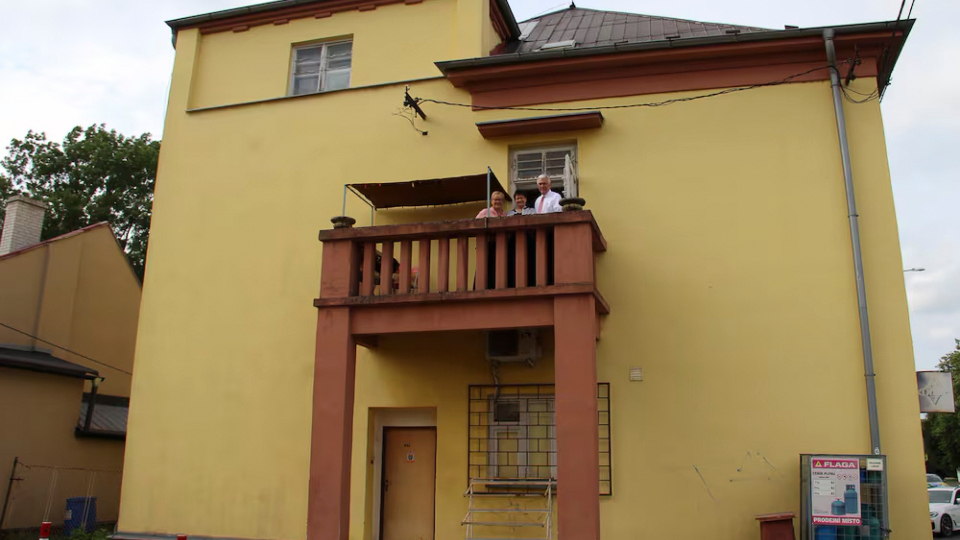
Uchtdorf-Europe-2024
From right to left, Elder Dieter F. Uchtdorf of the Quorum of the Twelve Apostles; his wife, Harriet; and their daughter, Antje Evans, stand on the second-floor balcony of a home in Ostrava, Czech Republic, on Wednesday, May 22, 2024. Elder Uchtdorf lived there with his parents and siblings when he was a young child and remembers getting his head stuck in bars of the balcony railing. Photo provided by Elder Dieter F. Uchtdorf, courtesy of Church News.All rights reserved.Elder Uchtdorf reflected on what living in — and then leaving — Ostrava meant. “When you think about it, if we would not have had to leave there, if everything would have been stable, if the war would have come out different — we never would have had to flee to Zwickau, back to our grandparents,” he said, adding, “We never would have learned about the gospel. When you look back, you see the dots connect.
“I don’t think that the Lord had prepared all this,” he continued. “He knew that it was happening, but we could have decided differently. We could have gone somewhere else — our choices are still valid. But it happened this way.”
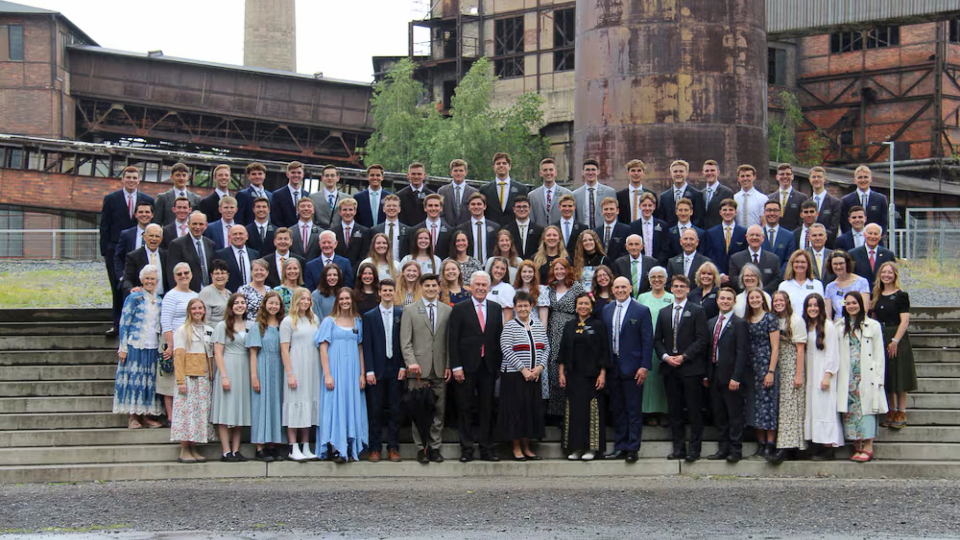
Uchtdorf-Europe-2024
Elder Dieter F. Uchtdorf of the Quorum of the Twelve Apostles and his wife, Harriet, both front row center, pause for a photo with missionaries of the Czech/Slovak Mission in Ostrava, Czech Republic in late May 2024. Elder Uchtdorf was born in Ostrava and lived there until he was 4 years old before fleeing with his mother and older siblings to Germany during World War II. Photo provided by Elder Dieter F. Uchtdorf, courtesy of Church News.All rights reserved.Lessons in Dresden
Elder Uchtdorf also spent time in Dresden, the rebuilt city that was all but destroyed in the extensive February 1945 firebombing of the city toward the end of World War II.
“I saw the bombers fly across — we went to our bunkers because we thought that maybe they were coming for us,” recalled Elder Uchtdorf, who was then a young boy in Zwickau, 60 miles (95 kilometers) southwest of Dresden after having immigrated as refugees from Ostrava in the harsh winter of 1944-45 just weeks before. “We came through Dresden because it was the center of flow of refugees coming from the east.”
He noticed the statue of Martin Luther in front of the city’s well-known and rebuilt Frauenkirche Lutheran church, reflecting how the Luther-led Reformation served as a precursor for the Restoration of the gospel through the Prophet Joseph Smith. He also climbed to the church’s dome for a 360-degree panoramic view of the rebuilt city, including the thunder and lightning of an approaching storm, reminiscent of the hymn “Master, the Tempest Is Raging” that was sung at the Dresden stake conference.
Recalling photos of a once-leveled Dresden to the current view, Elder Uchtdorf said he was touched “to see how it is blooming and beautiful, how human creativity and desire to do the right thing can change the world — can change it out of ruins into a beautiful place again.”
He expanded his mental perspective from Dresden to the surrounding areas of eastern Germany and into Poland — once-vibrant areas of Church stability where lands later were devastated and populations diminished by WWII and the Cold War. The Church today is seeing increasing membership and strong membership; it also has the Freiberg temple, near Dresden, the first house of the Lord in a Communist country when dedicated in 1985.
“To see it now,” said Elder Uchtdorf of the area, ”and how it blooms again in beauty and how the people are peaceful with each other — there is reconciliation, that is a word that I love,” he said. “When you drive through these countries, you see the effects of reconciliation — which is nothing else than practical repentance and forgiveness.”
Conversion in Zwickau
Zwickau sits some 260 miles (420 kilometers) west from Ostrava in a direct-line distance — but modern-day trains don’t travel a straight-line route, let alone the WWII-era trains. In Zwickau, the Uchtdorfs joined grandparents — and it was a grandmother standing in a long line to purchase post-war scarce products who met an elderly Latter-day Saint woman who invited the grandmother to join her for Sunday church services.
His grandmother and parents accepted the invitation and attended worship services in a small, back-of-the-lot home, not taking the children because of the uncertainty of how they would be received. Finding families with children, the Uchtdorf parents brought theirs the next week — and every week as they continued learning about the gospel of Jesus Christ and progressing toward baptism.
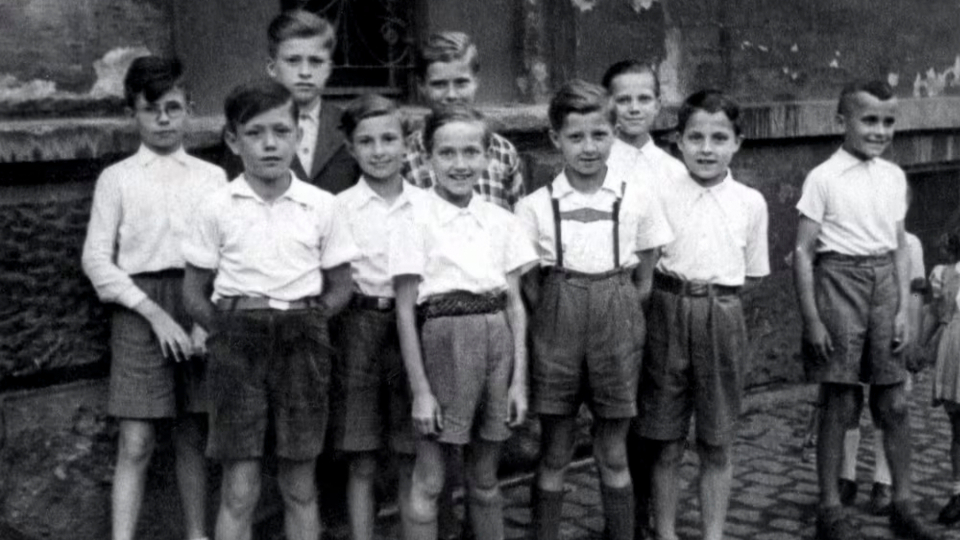
His grandmother, parents and older siblings were baptized late one afternoon in an outdoor swimming area, a beach-type pool on a little lake. Young Dieter was 6, two years from being of age for baptism.
“There was a peaceful quiet, after the war. It was not far from where we lived and where we had experienced some pretty sad things,” Elder Uchtdorf remembered, adding: “The family was dressed in white and was baptized there. It was a very emotional experience for me to go back to that place.”
He also returned to the public swimming pool where he was baptized at age 8 — a pool since restored.
What he couldn’t return to was the villa used as a meetinghouse in the late 1940s to replace the small house, with the center area remodeled to serve as a chapel. The villa was leveled by the Communist regime not long after the Uchtdorfs and others fled Zwickau for West Germany in 1952, replaced with large apartment buildings.
Elder Uchtdorf remembered the villa’s pump organ and a trio of beautiful stained-glass windows, including one of a kneeling Joseph Smith in the Sacred Grove and another of the Savior. He had long wondered what happened to the windows.
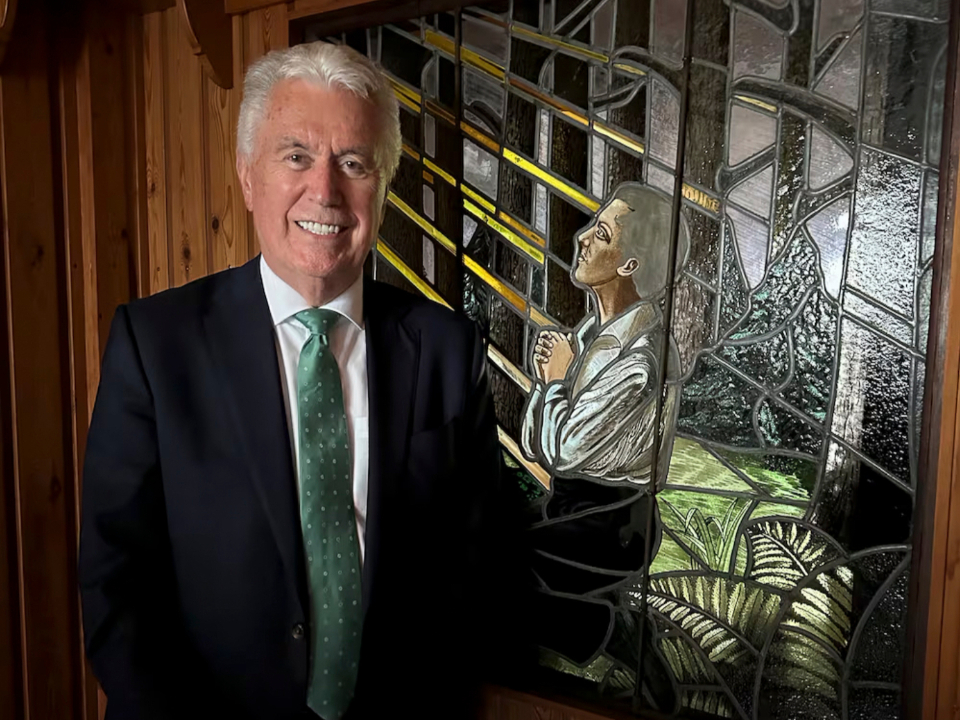
Uchtdorf-Europe-2024
Elder Dieter F. Uchtdorf of the Quorum of the Twelve Apostles stands beside a stained-glass window — depicting a young Joseph Smith praying in the Sacred Grove — in a home in Zwickau, Germany in May 2024. The art-glass piece was once in a since-demolished villa used for Latter-day Saint services in Zwickau when Elder Uchtdorf was a child. Photo provided by Elder Dieter F. Uchtdorf, courtesy of Church News.All rights reserved.During his recent return to Zwickau, he learned that a woman — a former city mayor — had obtained the Joseph Smith art-glass piece and had it installed in her home. Through a member and mutual friend, the Uchtdorfs were allowed to visit the home, with Elder Uchtdorf again able to lay eyes on what for him as a young boy had been an inspirational piece.
“It was a privilege and honor to be assigned to pump air into the organ while the organist was playing the music,” recalled Elder Uchtdorf, saying he felt motivated to pump while looking at the stained-glass windows.
He remembers being inspired by seeing the visual depiction, listening to the hymns of the Restoration and serving others. “I looked at those windows, and I saw the Savior in the middle, and I saw Joseph in prayer — for me, those were moments when I knew the Savior was real and that Joseph was real.”
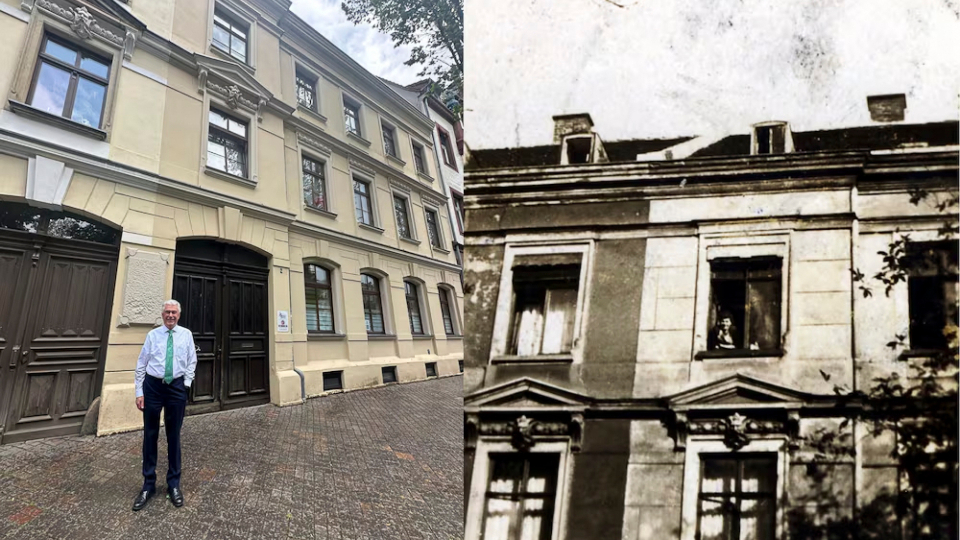
Uchtdorf-Europe-2024
Left photo: Elder Dieter F. Uchtdorf of the Quorum of the Twelve Apostles stands in front of his childhood home in Zwickau, Germany, in late May 2024. Right photo: Elder Uchtdorf's mother, Hildegard Opelt Uchtdorf, stands at a window in their home in Zwickau, where the Uchtdorf family lived from the mid-1940s to 1952. All rights reserved.More in Frankfurt
From Zwickau, the Uchtdorfs moved on to Frankfurt, when as a teenager Dieter Uchtdorf would meet a young convert by the name of Harriet Reich. While the Uchtdorfs were the product of member-missionary efforts, Harriet Reich and her widowed mother and sister were converts through direct missionary contact.
Elder Uchtdorf has often spoken of the “fourth floor, last door” efforts of the full-time missionaries finding the Reich mother and daughters. Disillusioned in religion because of the horrors of fighting in the war, Sister Uchtdorf’s father had passed away less than a half-year before. Her mother not only read the brief passages the missionaries marked for her in the Book of Mormon but had also finished the entire book before their return. Her earliest testimony was steeped in the importance of temples and the covenants made there for eternal marriages and families.
“You look back and connect the dots,” said Elder Uchtdorf, highlighting what started as a widow seeking the purpose of life. The dots continue on lead lead to Elder and Sister Uchtdorf first meeting as teens, later marrying and then raising a young family in and around Frankfurt and serving in the Church. In Frankfurt, Elder Uchtdorf served one of his two times as stake president and chaired the dedication and open house committee for the Frankfurt Germany Temple, which he later rededicated as an Apostle.
Back in Time
If Elder Uchtdorf could go back in time and reassure his younger self, what would he tell young Dieter of age 4 or 8 or 11?
Pausing briefly to ponder and check his emotions, Elder Uchtdorf answered: “‘Don’t be afraid. Trust there’s a loving Heavenly Father that will guide you.’”
Does he remember being afraid? “Yes, a lot.”
Those past fears include traveling during a terribly cold winter on an unheated train with frozen-over windows. “We were riding in a refrigerator, so to speak,” he said, recalling an older brother 12 years his senior who was dealing with nightmares and sleepwalking. “We had to watch him that he didn’t leave the train while the train was moving.”
And Elder Uchtdorf has often told the story of his mother, who briefly left the children at a train stop to find food and warm drink for them, only to get turned around and start panicking, thinking she was lost and separated from her family.
“It was always the fear to survive — that was very basic,” he recalled, including times of extreme hunger, particularly for his parents, who sacrificed for their children. He returned to thoughts of self-counsel: “That is what I would say: ‘Don’t be afraid. Don’t fear. There is something better for you. So trust Heavenly Father, trust Him. There is a God in heaven; He is a wonderful Father in Heaven.’”